英美文学名词解释
英美文学名词解释
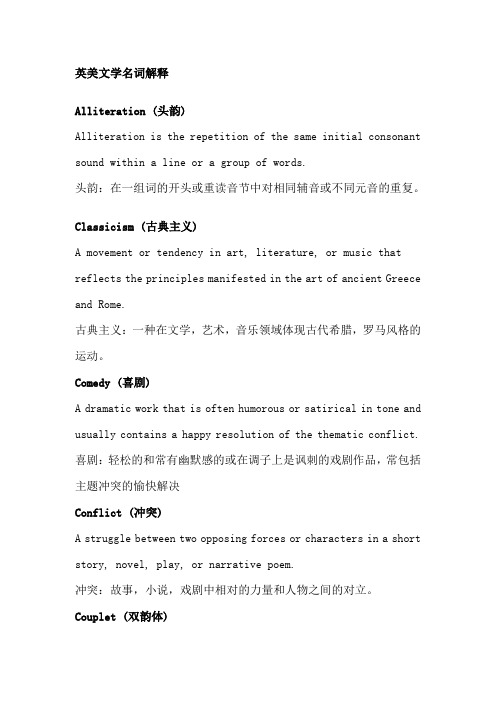
英美文学名词解释Alliteration (头韵)Alliteration is the repetition of the same initial consonant sound within a line or a group of words.头韵:在一组词的开头或重读音节中对相同辅音或不同元音的重复。
Classicism (古典主义)A movement or tendency in art, literature, or music that reflects the principles manifested in the art of ancient Greece and Rome.古典主义:一种在文学,艺术,音乐领域体现古代希腊,罗马风格的运动。
Comedy (喜剧)A dramatic work that is often humorous or satirical in tone and usually contains a happy resolution of the thematic conflict. 喜剧:轻松的和常有幽默感的或在调子上是讽刺的戏剧作品,常包括主题冲突的愉快解决Conflict (冲突)A struggle between two opposing forces or characters in a short story, novel, play, or narrative poem.冲突:故事,小说,戏剧中相对的力量和人物之间的对立。
Couplet (双韵体)A unit of verse consisting of two successive lines, usually rhyming and having the same meter and often forming a complete thought or syntactic unit.双韵体:包括两个相连的诗行的一种诗的单位,通常压韵并具有同样的格律,经常组成一个完整的意思和句法单位Heroic couplet (英雄双韵体)A couplet written in iambic pentameter is called a heroic couplet.英雄双韵体:五步抑扬格的双韵体称英雄双韵体。
英美文学名词解释总结.doc
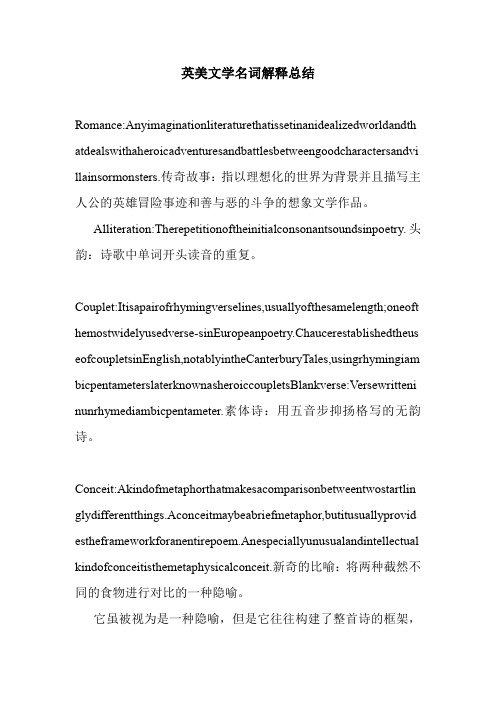
英美文学名词解释总结Romance:Anyimaginationliteraturethatissetinanidealizedworldandth atdealswithaheroicadventuresandbattlesbetweengoodcharactersandvi llainsormonsters.传奇故事:指以理想化的世界为背景并且描写主人公的英雄冒险事迹和善与恶的斗争的想象文学作品。
Alliteration:Therepetitionoftheinitialconsonantsoundsinpoetry.头韵:诗歌中单词开头读音的重复。
Couplet:Itisapairofrhymingverselines,usuallyofthesamelength;oneoft hemostwidelyusedverse-sinEuropeanpoetry.Chaucerestablishedtheus eofcoupletsinEnglish,notablyintheCanterburyTales,usingrhymingiam bicpentameterslaterknownasheroiccoupletsBlankverse:Versewritteni nunrhymediambicpentameter.素体诗:用五音步抑扬格写的无韵诗。
Conceit:Akindofmetaphorthatmakesacomparisonbetweentwostartlin glydifferentthings.Aconceitmaybeabriefmetaphor,butitusuallyprovid estheframeworkforanentirepoem.Anespeciallyunusualandintellectual kindofconceitisthemetaphysicalconceit.新奇的比喻:将两种截然不同的食物进行对比的一种隐喻。
(完整word版)英美文学名词解释总结中文版(东北师大重点)

名词解释1. Abby Theatre 阿贝剧院阿贝剧院是爱尔兰的国家剧院,由爱尔兰著名诗人William Butler Yeats和Lady Augusta Gregory创建。
该剧院上演爱尔兰剧作家的作品。
Lady Gregory是阿贝剧院的导演,同时也是个剧作家(dramatist)。
2。
Aestheticism 唯美主义基本原则:Art for art’s sake.基本人物:英国运用该美学理论的第一人士Walter Pater。
Oscar Wilder(Picture of Dorian Gray)是该理论的杰出代表。
基本思想:唯美主义崇尚艺术高于生活,生活应该模仿艺术,而不是艺术模仿生活。
这是对Victorian工业发展时期宣扬的物质崇拜(materialism)和商业主义(commercialism)的一种反抗,也是艺术为道德或金钱而服务(art for money’s sake)的维多利亚传统的挑战。
3. Age of Enlightenment 启蒙时代1. 英国的18世纪又被称为启蒙时代,总的来说是资本主义反对封建主义的时代.2. 启蒙运动是一场进步的思想运动,盛行于法国后传播到西欧。
3. 启蒙运动是15和16世界文艺复兴运动的延续和深入,它的目的是用现代哲学和艺术观点启蒙整个世界.4。
崇尚理性,平等,和科学,倡导大众教育。
文学在当时变成了非常受欢迎的公众教育的手段,带有强烈的说教和道德教育性质。
5. 代表人物:Alexander Pope,Jonathan Swift.4. Age of Realism现实主义时期1。
现实主义是对浪漫主义时期一种反抗,并铺就了通往现代主义文学的道路。
2。
在这一时期,新一代的作家对于老一辈的浪漫主义和感伤主义的思想非常不满,提出一个新的灵感,其特点就是在生活现实方面有着极大的兴趣.它的目标是描写生活每一方面的现实,抛弃主观偏见,理想主义或者任何浪漫的色彩。
(完整版)英美文学名词解释最全版
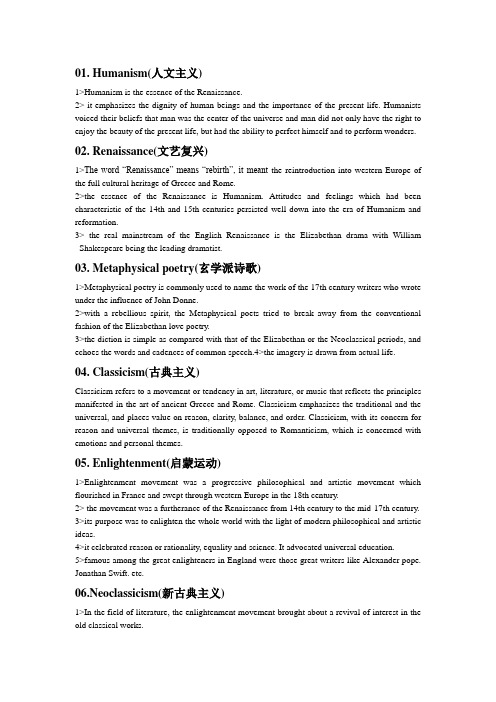
01. Humanism(人文主义)1>Humanism is the essence of the Renaissance.2> it emphasizes the dignity of human beings and the importance of the present life. Humanists voiced their beliefs that man was the center of the universe and man did not only have the right to enjoy the beauty of the present life, but had the ability to perfect himself and to perform wonders.02. Renaissance(文艺复兴)1>The word “Renaissance”means “rebirth”, it meant the reintroduction into western Europe of the full cultural heritage of Greece and Rome.2>the essence of the Renaissance is Humanism. Attitudes and feelings which had been characteristic of the 14th and 15th centuries persisted well down into the era of Humanism and reformation.3> the real mainstream of the English Renaissance is the Elizabethan drama with William Shakespeare being the leading dramatist.03. Metaphysical poetry(玄学派诗歌)1>Metaphysical poetry is commonly used to name the work of the 17th century writers who wrote under the influence of John Donne.2>with a rebellious spirit, the Metaphysical poets tried to break away from the conventional fashion of the Elizabethan love poetry.3>the diction is simple as compared with that of the Elizabethan or the Neoclassical periods, and echoes the words and cadences of common speech.4>the imagery is drawn from actual life.04. Classicism(古典主义)Classicism refers to a movement or tendency in art, literature, or music that reflects the principles manifested in the art of ancient Greece and Rome. Classicism emphasizes the traditional and the universal, and places value on reason, clarity, balance, and order. Classicism, with its concern for reason and universal themes, is traditionally opposed to Romanticism, which is concerned with emotions and personal themes.05. Enlightenment(启蒙运动)1>Enlightenment movement was a progressive philosophical and artistic movement which flourished in France and swept through western Europe in the 18th century.2> the movement was a furtherance of the Renaissance from 14th century to the mid-17th century.3>its purpose was to enlighten the whole world with the light of modern philosophical and artistic ideas.4>it celebrated reason or rationality, equality and science. It advocated universal education.5>famous among the great enlighteners in England were those great writers like Alexander pope. Jonathan Swift. etc.06.Neoclassicism(新古典主义)1>In the field of literature, the enlightenment movement brought about a revival of interest in the old classical works.2>this tendency is known as neoclassicism. The Neoclassicists held that forms of literature were to be modeled after the classical works of the ancient Greek and Roman writers such as Homer and Virgil and those of the contemporary French ones.3> they believed that the artistic ideals should be order, logic, restrained emotion and accuracy, and that literature should be judged in terms of its service to humanity.07. The Graveyard School(墓地派诗歌)1>The Graveyard School refers to a school of poets of the 18th century whose poems are mostly devoted to a sentimental lamentation or meditation on life. Past and present ,with death and graveyard as themes.2>Thomas Gray is considered to be the leading figure of this school and his Elegy written in a country churchyard is its most representative work.08. Romanticism(浪漫主义)1>In the mid-18th century, a new literary movement called romanticism came to Europe and then to England.2>It was characterized by a strong protest against the bondage of neoclassicism, which emphasized reason, order and elegant wit. Instead, romanticism gave primary concern to passion, emotion, and natural beauty.3>In the history of literature. Romanticism is generally regarded as the thought that designates a literary and philosophical theory which tends to see the individual as the very center of all life and experience. 4> The English romantic period is an age of poetry which prevailed in England from 1798 to 1837. The major romantic poets include Wordsworth, Byron and Shelley.09. Byronic Hero(拜伦式英雄)1>Byronic hero refers to a proud, mysterious rebel figure of noble origin.2> with immense superiority in his passions and powers, this Byronic Hero would carry on his shoulders the burden of righting all the wrongs in a corrupt society. And would rise single-handedly against any kind of tyrannical rules either in government, in religion, or in moral principles with unconquerable wills and inexhaustible energies.3> Byron’s chief contribution to English literature is his creation of the “Byronic Hero”10. Critical Realism(批判现实主义)1>Critical Realism is a term applied to the realistic fiction in the late 19th and early 20th centuries.2> It means the tendency of writers and intellectuals in the period between 1875 and 1920 to apply the methods of realistic fiction to the criticism of society and the examination of social issues.3> Realist writers were all concerned about the fate of the common people and described what was faithful to reality.4> Charles Dickens is the most important critical realist.11. Aestheticism(美学主义)1>The basic theory of the Aesthetic movement--- “art for art’s sake” was set forth by a French poet, Theophile Gautier, the first Englishman who wrote about the theory of aestheticism was Walter Pater.2> aestheticism places art above life, and holds that life should imitate art, not art imitate life.3> According to the aesthetes, all artistic creation is absolutely subjective as opposed to objective. Art should be free from any influence of egoism. Only when art is for art’s sake, can it be immortal. They believed that art should be unconcerned with controversial issues, such as politics and morality, and that it should be restricted to contributing beauty in a highly polished style.4> This is one of the reactions against the materialism and commercialism of the Victorian industrial era, as well as a reaction against the Victorian convention of art for morality’s sake, or art for money’s sake.美学运动的基本原则”为艺术而艺术”最初由法国诗人西奥费尔.高缔尔提出,英国运用该美学理论的第一人是沃尔特.佩特.美学主义崇尚艺术高于生活,认为生活应模仿艺术,而不是艺术模仿生活.在美学主义看来,所有的艺术创作都是绝对主观而非客观的产物.艺术不应受任何功利的影响,只有当艺术为艺术而创作时,艺术才能成为不朽之作.他们还认为艺术不应只关注一些热点话题如政治和道德问题,艺术应着力于以华丽的风格张扬美.这是对维多利亚工业发展时期物质崇拜的一种回应,也是向艺术为道德或为金钱而服务的维多利亚传统的挑战.12.The Victorian period(维多利亚时期)1>In this period, the novel became the most widely read and the most vital and challenging expression of progressive thought. While sticking to the principle of faithful representation of the 18th century realist novel, novelists in this period carried their duty forward to criticism of the society and the defense of the mass.2> although writing from different points of view and with different techniques, they shared one thing in common, that is, they were all concerned about the fate of the common people. They were angry with the inhuman social institutions, the decaying social morality as represented by the money-worship and Utilitarianism, and the widespread misery, poverty and injustice.3>their truthful picture of people’s life and bitter and strong criticism of the society had done much in awakening the public consciousness to the social problems and in the actual improvement of the society.4> Charles Dickens is the leading figure of the Victorian period.13. Modernism(现代主义)1>Modernism is comprehensive but vague term for a movement , which begin in the late 19th century and which has had a wide influence internationally during much of the 20th century.2> modernism takes the irrational philosophy and the theory of psycho-analysis as its theoretical case.3> the term pertains to all the creative arts. Especially poetry, fiction, drama, painting, music and architecture.4> in England from early in the 20th century and during the 1920s and 1930s, in America from shortly before the first world war and on during the inter-war period, modernist tendencies were at their most active and fruitful.5>as far as literature is concerned, Modernism reveals a breaking away from established rules, traditions and conventions. fresh ways of looki ng at man’s position and function in the universe and many experiments in form and style. It is particularly concerned with language and how to use it and with writing itself.14. Stream of consciousness(意识流)(or interior monologue)In literary criticism, Stream of consciousness denotes a literary technique which seeks to describe an individual’s point of view by giving the written equivalent of the character’s thought processes. Stream of consciousness writing is strongly associated with the modernist movement. Its introduction in the literary context, transferred from psychology, is attributed to May Sinclair. Stream of consciousness writing is usually regarded as a special form of interior monologue and is characterized by associative leaps in syntax and punctuation that can make the prose difficult to follow, tracing as they do a character’s fragmentary thoughts and sensory feelings. Famous writers to employ this technique in the English language include James Joyce and William Faulkner.学术界认为意识流是一种通过直接描述人物思维过程来寻求个人视角的文学写作技巧。
英美文学术语解释
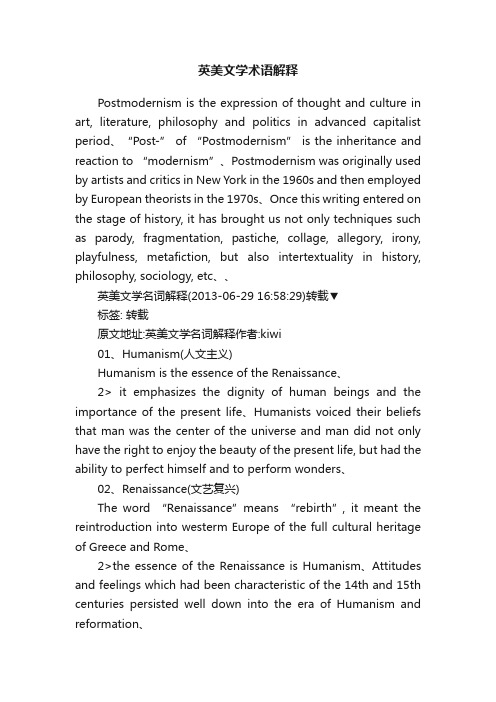
英美文学术语解释Postmodernism is the expression of thought and culture in art, literature, philosophy and politics in advanced capitalist period、“Post-” of “Postmodernism” is the inheritance and reaction to “modernism”、Postmodernism was originally used by artists and critics in New York in the 1960s and then employed by European theorists in the 1970s、Once this writing entered on the stage of history, it has brought us not only techniques such as parody, fragmentation, pastiche, collage, allegory, irony, playfulness, metafiction, but also intertextuality in history, philosophy, sociology, etc、、英美文学名词解释(2013-06-29 16:58:29)转载▼标签: 转载原文地址:英美文学名词解释作者:kiwi01、Humanism(人文主义)Humanism is the essence of the Renaissance、2> it emphasizes the dignity of human beings and the importance of the present life、Humanists voiced their beliefs that man was the center of the universe and man did not only have the right to enjoy the beauty of the present life, but had the ability to perfect himself and to perform wonders、02、Renaissance(文艺复兴)The word “Renaissance”means “rebirth”, it meant the reintroduction into westerm Europe of the full cultural heritage of Greece and Rome、2>the essence of the Renaissance is Humanism、Attitudes and feelings which had been characteristic of the 14th and 15th centuries persisted well down into the era of Humanism and reformation、3> the real mainstream of the english Renaissance is the Elizabethan drama with william shakespeare being the leading dramatist、03、Metaphysical poetry(玄学派诗歌)Metaphysical poetry is commonly used to name the work of the 17th century writers who wrote under the influence of John Donne、2>with a rebellious spirit, the Metaphysical poets tried to break away from the conventional fashion of the Elizabethan love poetry、3>the diction is simple as compared with that of the Elizabethan or the Neoclassical periods, and echoes the words and cadences of common speech、4>the imagery is drawn from actual life、04、Classcism(古典主义)Classcism refers to a movement or tendency in art, literature, or music that reflects the principles manifested in the art of ancient Greece and Rome、Classicism emphasizesthe traditional and the universal, and places value on reason, clarity, balance, and order、Classicism, with its concern for reason and universal themes, is traditionally opposed to Romanticism, which is concerned with emotions and personal themes、05、Enlightenment(启蒙运动)Enlightenment movement was a progressive philosophical and artistic movement which flourished in france and swept through western Europe in the 18th century、2> the movement was a furtherance of the Renaissance from 14th century to the mid-17th century、3>its purpose was to enlighten the whole world with the light of modern philosophical and artistic ideas、4>it celebrated reason or rationality, equality and science、It advocated universal education、5>famous among the great enlighteners in england were those great writers like Alexander pope、Jonathan swift、etc、06、Neoclassicism(新古典主义)In the field of literature, the enlightenment movement brought about a revival of interest in the old classical works、2>this tendency is known as neoclassicism、The Neoclassicists held that forms of literature were to be modeled after the classical works of the ancient Greek and Roman writers such as Homer and Virgil and those of the contemporary French ones、3> they believed that the artistic ideals should be order, logic, restrained emotion and accuracy, and that literature should be judged in terms of its service to humanity、07、The Graveyard School(墓地派诗歌)The Graveyard School refers to a school of poets of the 18th century whose poems are mostly devoted to a sentimental lamentation or meditation on life、Past and present, with death and graveyard as themes、2>Thomas Gray is considered to be the leading figure of this school and his Elegy written in a country churchyard is its most representative work、08、Romanticism(浪漫主义)1>In the mid-18th century, a new literary movement called romanticism came to Europe and then to England、2>It was characterized by a strong protest against the bondage of neoclassicism, which emphasized reason, order and elegant wit、Instead, romanticism gave primary concern to passion, emotion, and natural beauty、3>In the history of literature、Romanticism is generallyregarded as the thought that designates a literary and philosophical theory which tends to see the individual as the very center of all life and experience、4> The English romantic period is an age of poetry which prevailed in England from 1798 to 1837、The major romantic poets include Wordsworth, Byron and Shelley、09、Byronic Hero(拜伦式英雄)Byronic hero refers to a proud, mysterious rebel figure of noble origin、2> with immense superiority in his passions and powers, this Byronic Hero would carry on his shoulders the burden of righting all the wrongs in a corrupt society、And would rise single-handedly against any kind of tyrannical rules either in government, in religion, or in moral principles with unconquerable wills and inexhaustible energies、3> Byron’s chief contribution to English literature is his creation of the “Byronic Hero”10、Critical Realism(批判现实主义)Critical Realism is a term applied to the realistic fiction in the late 19th and early 20th centuries、2> It means the tendency of writers and intellectuals in the period between 1875 and 1920 to apply the methods of realistic fiction to the criticism of society and the examination of social issues、3> Realist writers were all concerned about the fate of the common people and described what was faithful to reality、4> Charles Dickens is the most important critical realist、11、Aestheticism(美学主义)The basic theory of the Aesthetic movement--- “art for art’s sake” was set forth by a French poet, Theophile Gautier, the first Englishman who wrote about the theory of aestheticismwas Walter Pater、2> aestheticism places art above life, and holds that life should imitate art, not art imitate life、3> According to the aesthetes, all artistic creation is absolutely subjective as opposed to objective、Art should be free from any influence of egoism、Only when art is for art’s sake, can it be immortal、They believed that art should be unconcerned with controversial issues, such as politics and morality, and that it should be restricted to contributing beauty in a highly polished style、4> This is one of the reactions against the materialism and commercialism of the Victorian industrial era, as well as a reaction against the Victorian convention of art for morality’s sake, or a rt for money’s sake、美学运动的基本原则”为艺术而艺术”最初由法国诗人西奥费尔、高缔尔提出,英国运用该美学理论的第一人就是沃尔特、佩特、美学主义崇尚艺术高于生活,认为生活应模仿艺术,而不就是艺术模仿生活、在美学主义瞧来,所有的艺术创作都就是绝对主观而非客观的产物、艺术不应受任何功利的影响,只有当艺术为艺术而创作时,艺术才能成为不朽之作、她们还认为艺术不应只关注一些热点话题如政治与道德问题,艺术应着力于以华丽的风格张扬美、这就是对维多利亚工业发展时期物质崇拜的一种回应,也就是向艺术为道德或为金钱而服务的维多利亚传统的挑战、12、The Victorian period(维多利亚时期)In this period, the novel became the most widely read and the most vital and challenging expression of progressive thought、While sticking to the principle of faithful representation of the 18th century realist novel, novelists in this period carried their duty forward to criticism of the society and the defense of the mass、2> although writing from different points of view and with different techniques, they shared one thing in common, that is, they were all concerned about the fate of the common people、They were angry with the inhuman social institutions, the decaying social morality as represented by the money-worship and Utilitarianism, and the widespread misery, poverty and injustice、3>their truthful picture of people’s life and bitter and stro ng criticism of the society had done much in awakening the public consciousness to the social problems and in the actual improvement of the society、4> Charles Dickens is the leading figure of the Victorian period、13、Modernism(现代主义)Modernism is comprehensive but vague term for a movement , which begin in the late 19th century and which has had a wide influence internationally during much of the 20th century、。
英美文学名词解释最全版
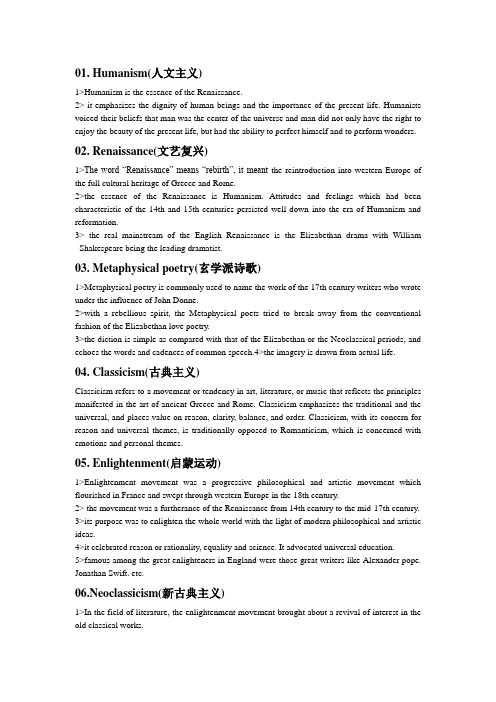
01. Humanism(人文主义)1>Humanism is the essence of the Renaissance.2> it emphasizes the dignity of human beings and the importance of the present life. Humanists voiced their beliefs that man was the center of the universe and man did not only have the right to enjoy the beauty of the present life, but had the ability to perfect himself and to perform wonders.02. Renaissance(文艺复兴)1>The word “Renaissance”means “rebirth”, it meant the reintroduction into western Europe of the full cultural heritage of Greece and Rome.2>the essence of the Renaissance is Humanism. Attitudes and feelings which had been characteristic of the 14th and 15th centuries persisted well down into the era of Humanism and reformation.3> the real mainstream of the English Renaissance is the Elizabethan drama with William Shakespeare being the leading dramatist.03. Metaphysical poetry(玄学派诗歌)1>Metaphysical poetry is commonly used to name the work of the 17th century writers who wrote under the influence of John Donne.2>with a rebellious spirit, the Metaphysical poets tried to break away from the conventional fashion of the Elizabethan love poetry.3>the diction is simple as compared with that of the Elizabethan or the Neoclassical periods, and echoes the words and cadences of common speech.4>the imagery is drawn from actual life.04. Classicism(古典主义)Classicism refers to a movement or tendency in art, literature, or music that reflects the principles manifested in the art of ancient Greece and Rome. Classicism emphasizes the traditional and the universal, and places value on reason, clarity, balance, and order. Classicism, with its concern for reason and universal themes, is traditionally opposed to Romanticism, which is concerned with emotions and personal themes.05. Enlightenment(启蒙运动)1>Enlightenment movement was a progressive philosophical and artistic movement which flourished in France and swept through western Europe in the 18th century.2> the movement was a furtherance of the Renaissance from 14th century to the mid-17th century.3>its purpose was to enlighten the whole world with the light of modern philosophical and artistic ideas.4>it celebrated reason or rationality, equality and science. It advocated universal education.5>famous among the great enlighteners in England were those great writers like Alexander pope. Jonathan Swift. etc.06.Neoclassicism(新古典主义)1>In the field of literature, the enlightenment movement brought about a revival of interest in the old classical works.2>this tendency is known as neoclassicism. The Neoclassicists held that forms of literature were to be modeled after the classical works of the ancient Greek and Roman writers such as Homer and Virgil and those of the contemporary French ones.3> they believed that the artistic ideals should be order, logic, restrained emotion and accuracy, and that literature should be judged in terms of its service to humanity.07. The Graveyard School(墓地派诗歌)1>The Graveyard School refers to a school of poets of the 18th century whose poems are mostly devoted to a sentimental lamentation or meditation on life. Past and present ,with death and graveyard as themes.2>Thomas Gray is considered to be the leading figure of this school and his Elegy written in a country churchyard is its most representative work.08. Romanticism(浪漫主义)1>In the mid-18th century, a new literary movement called romanticism came to Europe and then to England.2>It was characterized by a strong protest against the bondage of neoclassicism, which emphasized reason, order and elegant wit. Instead, romanticism gave primary concern to passion, emotion, and natural beauty.3>In the history of literature. Romanticism is generally regarded as the thought that designates a literary and philosophical theory which tends to see the individual as the very center of all life and experience. 4> The English romantic period is an age of poetry which prevailed in England from 1798 to 1837. The major romantic poets include Wordsworth, Byron and Shelley.09. Byronic Hero(拜伦式英雄)1>Byronic hero refers to a proud, mysterious rebel figure of noble origin.2> with immense superiority in his passions and powers, this Byronic Hero would carry on his shoulders the burden of righting all the wrongs in a corrupt society. And would rise single-handedly against any kind of tyrannical rules either in government, in religion, or in moral principles with unconquerable wills and inexhaustible energies.3> Byron’s chief contribution to English literature is his creation of the “Byronic Hero”10. Critical Realism(批判现实主义)1>Critical Realism is a term applied to the realistic fiction in the late 19th and early 20th centuries.2> It means the tendency of writers and intellectuals in the period between 1875 and 1920 to apply the methods of realistic fiction to the criticism of society and the examination of social issues.3> Realist writers were all concerned about the fate of the common people and described what was faithful to reality.4> Charles Dickens is the most important critical realist.11. Aestheticism(美学主义)1>The basic theory of the Aesthetic movement--- “art for art’s sake” was set forth by a French poet, Theophile Gautier, the first Englishman who wrote about the theory of aestheticism was Walter Pater.2> aestheticism places art above life, and holds that life should imitate art, not art imitate life.3> According to the aesthetes, all artistic creation is absolutely subjective as opposed to objective. Art should be free from any influence of egoism. Only when art is for art’s sake, can it be immortal. They believed that art should be unconcerned with controversial issues, such as politics and morality, and that it should be restricted to contributing beauty in a highly polished style.4> This is one of the reactions against the materialism and commercialism of the Victorian industrial era, as well as a reaction against the Victorian convention of art for morality’s sake, or art for money’s sake.美学运动的基本原则”为艺术而艺术”最初由法国诗人西奥费尔.高缔尔提出,英国运用该美学理论的第一人是沃尔特.佩特.美学主义崇尚艺术高于生活,认为生活应模仿艺术,而不是艺术模仿生活.在美学主义看来,所有的艺术创作都是绝对主观而非客观的产物.艺术不应受任何功利的影响,只有当艺术为艺术而创作时,艺术才能成为不朽之作.他们还认为艺术不应只关注一些热点话题如政治和道德问题,艺术应着力于以华丽的风格张扬美.这是对维多利亚工业发展时期物质崇拜的一种回应,也是向艺术为道德或为金钱而服务的维多利亚传统的挑战.12.The Victorian period(维多利亚时期)1>In this period, the novel became the most widely read and the most vital and challenging expression of progressive thought. While sticking to the principle of faithful representation of the 18th century realist novel, novelists in this period carried their duty forward to criticism of the society and the defense of the mass.2> although writing from different points of view and with different techniques, they shared one thing in common, that is, they were all concerned about the fate of the common people. They were angry with the inhuman social institutions, the decaying social morality as represented by the money-worship and Utilitarianism, and the widespread misery, poverty and injustice.3>their truthful picture of people’s life and bitter and strong criticism of the society had done much in awakening the public consciousness to the social problems and in the actual improvement of the society.4> Charles Dickens is the leading figure of the Victorian period.13. Modernism(现代主义)1>Modernism is comprehensive but vague term for a movement , which begin in the late 19th century and which has had a wide influence internationally during much of the 20th century.2> modernism takes the irrational philosophy and the theory of psycho-analysis as its theoretical case.3> the term pertains to all the creative arts. Especially poetry, fiction, drama, painting, music and architecture.4> in England from early in the 20th century and during the 1920s and 1930s, in America from shortly before the first world war and on during the inter-war period, modernist tendencies were at their most active and fruitful.5>as far as literature is concerned, Modernism reveals a breaking away from established rules, traditions and conventions. fresh ways of looki ng at man’s position and function in the universe and many experiments in form and style. It is particularly concerned with language and how to use it and with writing itself.14. Stream of consciousness(意识流)(or interior monologue)In literary criticism, Stream of consciousness denotes a literary technique which seeks to describe an individual’s point of view by giving the written equivalent of the character’s thought processes. Stream of consciousness writing is strongly associated with the modernist movement. Its introduction in the literary context, transferred from psychology, is attributed to May Sinclair. Stream of consciousness writing is usually regarded as a special form of interior monologue and is characterized by associative leaps in syntax and punctuation that can make the prose difficult to follow, tracing as they do a character’s fragmentary thoughts and sensory feelings. Famous writers to employ this technique in the English language include James Joyce and William Faulkner.学术界认为意识流是一种通过直接描述人物思维过程来寻求个人视角的文学写作技巧。
英美文学名词解释
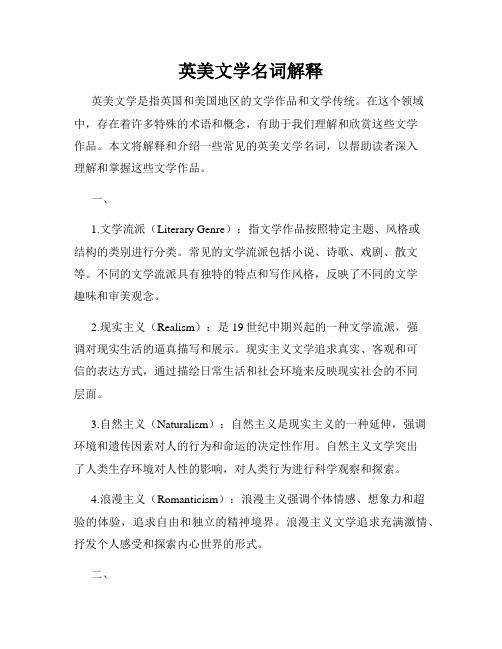
英美文学名词解释英美文学是指英国和美国地区的文学作品和文学传统。
在这个领域中,存在着许多特殊的术语和概念,有助于我们理解和欣赏这些文学作品。
本文将解释和介绍一些常见的英美文学名词,以帮助读者深入理解和掌握这些文学作品。
一、1.文学流派(Literary Genre):指文学作品按照特定主题、风格或结构的类别进行分类。
常见的文学流派包括小说、诗歌、戏剧、散文等。
不同的文学流派具有独特的特点和写作风格,反映了不同的文学趣味和审美观念。
2.现实主义(Realism):是19世纪中期兴起的一种文学流派,强调对现实生活的逼真描写和展示。
现实主义文学追求真实、客观和可信的表达方式,通过描绘日常生活和社会环境来反映现实社会的不同层面。
3.自然主义(Naturalism):自然主义是现实主义的一种延伸,强调环境和遗传因素对人的行为和命运的决定性作用。
自然主义文学突出了人类生存环境对人性的影响,对人类行为进行科学观察和探索。
4.浪漫主义(Romanticism):浪漫主义强调个体情感、想象力和超验的体验,追求自由和独立的精神境界。
浪漫主义文学追求充满激情、抒发个人感受和探索内心世界的形式。
二、1.象征主义(Symbolism):象征主义是19世纪末20世纪初出现的一种文学和艺术运动,强调使用象征性的意象和隐喻来表达深层的情感和思想。
象征主义文学倾向于表达个体的情感体验和心灵探索。
2.现代主义(Modernism):现代主义是20世纪初兴起的一种文学和艺术运动,强调对传统形式和观念的挑战和颠覆。
现代主义文学追求形式上的创新和实验,探索自我意识、哲学思考和社会变革。
3.后现代主义(Postmodernism):后现代主义是现代主义的继承和超越,强调文化多样性、相对主义和戏仿。
后现代主义文学打破传统的叙事和结构规则,以戏仿和颠覆的方式探索权力、真实性和历史观念。
4.现实主义小说(Realistic Novel):现实主义小说以真实的描写和社会批判为特征,通过塑造现实人物的经历和命运来反映社会问题。
英美文学名词解释
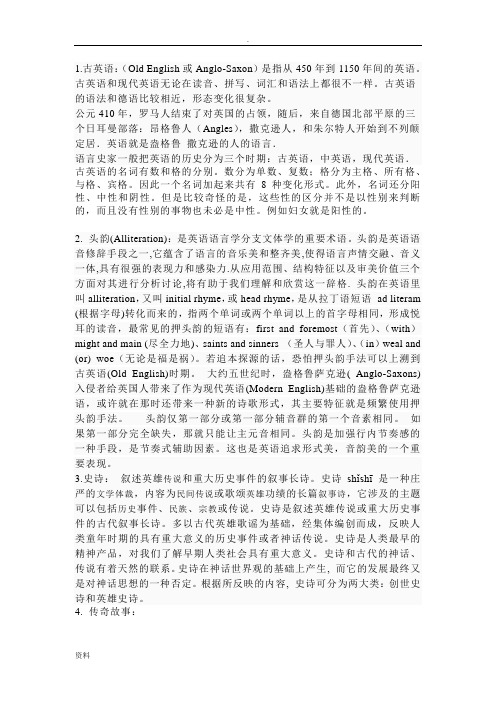
1.古英语:(Old English或Anglo-Saxon)是指从450年到1150年间的英语。
古英语和现代英语无论在读音、拼写、词汇和语法上都很不一样。
古英语的语法和德语比较相近,形态变化很复杂。
公元410年,罗马人结束了对英国的占领,随后,来自德国北部平原的三个日耳曼部落:昂格鲁人(Angles),撒克逊人,和朱尔特人开始到不列颠定居.英语就是盎格鲁_撒克逊的人的语言.语言史家一般把英语的历史分为三个时期:古英语,中英语,现代英语.古英语的名词有数和格的分别。
数分为单数、复数;格分为主格、所有格、与格、宾格。
因此一个名词加起来共有8种变化形式。
此外,名词还分阳性、中性和阴性。
但是比较奇怪的是,这些性的区分并不是以性别来判断的,而且没有性别的事物也未必是中性。
例如妇女就是阳性的。
2. 头韵(Alliteration):是英语语言学分支文体学的重要术语。
头韵是英语语音修辞手段之一,它蕴含了语言的音乐美和整齐美,使得语言声情交融、音义一体,具有很强的表现力和感染力.从应用范围、结构特征以及审美价值三个方面对其进行分析讨论,将有助于我们理解和欣赏这一辞格. 头韵在英语里叫alliteration,又叫initial rhyme,或head rhyme,是从拉丁语短语ad literam (根据字母)转化而来的,指两个单词或两个单词以上的首字母相同,形成悦耳的读音,最常见的押头韵的短语有:first and foremost(首先)、(with)might and main (尽全力地)、saints and sinners (圣人与罪人)、(in)weal and (or) woe(无论是福是祸)。
若追本探源的话,恐怕押头韵手法可以上溯到古英语(Old English)时期。
大约五世纪时,盎格鲁萨克逊( Anglo-Saxons)入侵者给英国人带来了作为现代英语(Modern English)基础的盎格鲁萨克逊语,或许就在那时还带来一种新的诗歌形式,其主要特征就是频繁使用押头韵手法。
英美文学名词解释总结中文版(东北师大重点)

名词解释1. Abby Theatre 阿贝剧院阿贝剧院是爱尔兰的国家剧院,由爱尔兰著名诗人William Butler Yeats和Lady Augusta Gregory创建。
该剧院上演爱尔兰剧作家的作品。
Lady Gregory是阿贝剧院的导演,同时也是个剧作家(dramatist)。
2.Aestheticism 唯美主义基本原则:Art for art’s sake.基本人物:英国运用该美学理论的第一人士Walter Pater。
Oscar Wilder(Picture of Dorian Gray)是该理论的杰出代表。
基本思想:唯美主义崇尚艺术高于生活,生活应该模仿艺术,而不是艺术模仿生活。
这是对Victorian工业发展时期宣扬的物质崇拜(materialism)和商业主义(commercialism)的一种反抗,也是艺术为道德或金钱而服务(art for money’s sake)的维多利亚传统的挑战。
3. Age of Enlightenment 启蒙时代1. 英国的18世纪又被称为启蒙时代,总的来说是资本主义反对封建主义的时代。
2. 启蒙运动是一场进步的思想运动,盛行于法国后传播到西欧。
3. 启蒙运动是15和16世界文艺复兴运动的延续和深入,它的目的是用现代哲学和艺术观点启蒙整个世界。
4. 崇尚理性,平等,和科学,倡导大众教育。
文学在当时变成了非常受欢迎的公众教育的手段,带有强烈的说教和道德教育性质。
5. 代表人物:Alexander Pope,Jonathan Swift。
4. Age of Realism现实主义时期1. 现实主义是对浪漫主义时期一种反抗,并铺就了通往现代主义文学的道路。
2. 在这一时期,新一代的作家对于老一辈的浪漫主义和感伤主义的思想非常不满,提出一个新的灵感,其特点就是在生活现实方面有着极大的兴趣。
它的目标是描写生活每一方面的现实,抛弃主观偏见,理想主义或者任何浪漫的色彩。
英美文学名词解释
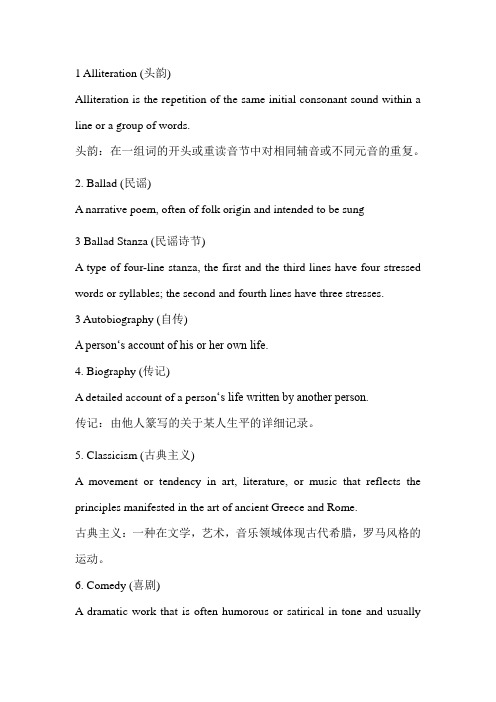
1 Alliteration (头韵)Alliteration is the repetition of the same initial consonant sound within a line or a group of words.头韵:在一组词的开头或重读音节中对相同辅音或不同元音的重复。
2. Ballad (民谣)A narrative poem, often of folk origin and intended to be sung3 Ballad Stanza (民谣诗节)A type of four-line stanza, the first and the third lines have four stressed words or syllables; the second and fourth lines have three stresses.3 Autobiography (自传)A person‘s account of his or her own life.4. Biography (传记)A detailed account of a person‘s life written by another person.传记:由他人篆写的关于某人生平的详细记录。
5. Classicism (古典主义)A movement or tendency in art, literature, or music that reflects the principles manifested in the art of ancient Greece and Rome.古典主义:一种在文学,艺术,音乐领域体现古代希腊,罗马风格的运动。
6. Comedy (喜剧)A dramatic work that is often humorous or satirical in tone and usuallycontains a happy resolution of the thematic conflict.喜剧:轻松的和常有幽默感的或在调子上是讽刺的戏剧作品,常包括主题冲突的愉快解决7. Conflict (冲突)A struggle between two opposing forces or characters in a short story, novel, play, or narrative poem.冲突:故事,小说,戏剧中相对的力量和人物之间的对立。
英美文学名词解释总结
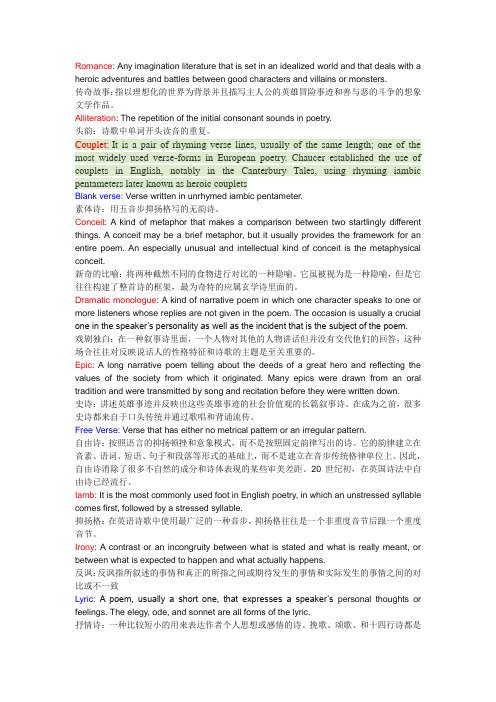
Romance: Any imagination literature that is set in an idealized world and that deals with a heroic adventures and battles between good characters and villains or monsters.传奇故事:指以理想化的世界为背景并且描写主人公的英雄冒险事迹和善与恶的斗争的想象文学作品。
Alliteration: The repetition of the initial consonant sounds in poetry.头韵:诗歌中单词开头读音的重复。
Couplet: It is a pair of rhyming verse lines, usually of the same length; one of the most widely used verse-forms in European poetry. Chaucer established the use of couplets in English, notably in the Canterbury Tales, using rhyming iambic pentameters later known as heroic coupletsBlank verse: Verse written in unrhymed iambic pentameter.素体诗:用五音步抑扬格写的无韵诗。
Conceit: A kind of metaphor that makes a comparison between two startlingly different things. A conceit may be a brief metaphor, but it usually provides the framework for an entire poem. An especially unusual and intellectual kind of conceit is the metaphysical conceit.新奇的比喻:将两种截然不同的食物进行对比的一种隐喻。
环球英美文学名词解释
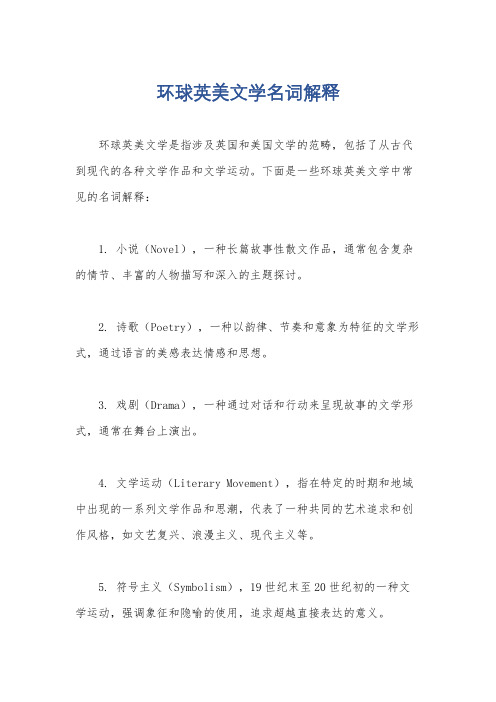
环球英美文学名词解释
环球英美文学是指涉及英国和美国文学的范畴,包括了从古代到现代的各种文学作品和文学运动。
下面是一些环球英美文学中常见的名词解释:
1. 小说(Novel),一种长篇故事性散文作品,通常包含复杂的情节、丰富的人物描写和深入的主题探讨。
2. 诗歌(Poetry),一种以韵律、节奏和意象为特征的文学形式,通过语言的美感表达情感和思想。
3. 戏剧(Drama),一种通过对话和行动来呈现故事的文学形式,通常在舞台上演出。
4. 文学运动(Literary Movement),指在特定的时期和地域中出现的一系列文学作品和思潮,代表了一种共同的艺术追求和创作风格,如文艺复兴、浪漫主义、现代主义等。
5. 符号主义(Symbolism),19世纪末至20世纪初的一种文学运动,强调象征和隐喻的使用,追求超越直接表达的意义。
6. 现实主义(Realism),19世纪中期兴起的一种文学运动,试图以客观真实的方式描绘社会生活,关注社会问题和人性。
7. 自然主义(Naturalism),19世纪末的一种文学运动,强调环境和遗传对人性的影响,揭示社会底层的艰苦生活和人类的本性。
8. 象征主义(Imagism),20世纪初的一种文学运动,追求简洁、直接和精确的语言,注重意象和感官经验的表达。
9. 后现代主义(Postmodernism),20世纪后半叶兴起的一种文学思潮,挑战传统的叙事结构和真实性,强调多元性、相对性和模糊性。
以上仅是环球英美文学中一些常见名词的简要解释,实际上还有许多其他的名词和概念需要深入研究和理解。
英美文学重点知识归纳

英美文学重点知识归纳一、英美文学的概念和特点英美文学是指英国和美国的文学作品,包括小说、诗歌、剧本等。
它具有以下几个特点:1.多元化:英美文学以其丰富多样的风格和流派而闻名。
从古典主义到浪漫主义,从现代主义到后现代主义,英美文学不断演变和发展,展示了人类思想和情感的多样性。
2.自由和开放性:英美文学强调个体的自由和独立思考,在作品中反映了社会、政治和文化的变革。
自由主义和个人主义的精神贯穿在英美文学的历史中。
3.注重个人感受和情感表达:英美文学注重个人感受和情感表达,通过描写人物内心的矛盾和困惑,展示了人性的复杂和多样性。
二、英美文学的重要时期和代表作品1. 文艺复兴时期(16世纪)文艺复兴时期是英美文学的重要里程碑,代表作品有:•威廉·莎士比亚的剧作《哈姆雷特》、《罗密欧与朱丽叶》等,深刻地反映了人性的复杂性和命运的无常。
•约翰·米尔顿的史诗《失乐园》,通过对上帝、撒旦和亚当夏娃的描写,揭示了人类的原罪和思想的自由。
2. 浪漫主义时期(18世纪末至19世纪初)浪漫主义时期是英美文学的重要发展阶段,代表作品有:•威廉·华兹华斯的诗集《抒情诗选集》,强调对自然和个人感受的表达,展现了对自由和灵魂的渴望。
•简·奥斯汀的小说《傲慢与偏见》,通过对社会等级和女性地位的描写,呈现了封建社会的弊端。
3. 现代主义时期(20世纪初至中期)现代主义时期是英美文学的革命性时期,代表作品有:•弗吉尼亚·伍尔夫的小说《至灵之泉》,以流动的意识流体式叙述,探索了心灵的迷茫和现代社会的困惑。
•T·S·艾略特的诗集《荒原》,通过对现代社会的批判和对个体灵魂的探索,反映了人类在现代社会中的孤独和迷失。
三、英美文学的重要作家和代表作1. 威廉·莎士比亚(1564-1616)威廉·莎士比亚是英国文学史上最伟大的剧作家之一,代表作品有:•《哈姆雷特》:探讨了人性的矛盾和命运的无常,是世界戏剧史上最重要的作品之一。
英美文学名词解释汉语版

英美文学名词解释汉语版
1. 小说 (Novel): 是一种长篇的虚构故事,通常以人物形象和情节为主要构成要素。
2. 散文 (Prose): 是一种以自由的、非诗歌形式的文学作品,通常有较为正式的句子结构和逻辑表达方式。
3. 诗歌 (Poetry): 是一种以押韵、节奏和音乐性为特点的文学形式,通常用比喻、象征和意象来表达作者的情感和观点。
4. 戏剧 (Drama): 是一种能够在舞台上演出的文学形式,通常包括对话、角色互动和舞台指导。
5. 悲剧 (Tragedy): 是一种戏剧类型,通常描绘了主角在命运和自身缺陷之间的斗争,并以悲惨结局告终。
6. 喜剧 (Comedy): 是一种戏剧类型,通常以幽默和滑稽情节为特点,旨在给观众带来愉快和欢笑。
7. 叙事诗 (Epic poem): 是一种长篇叙事诗歌,从古代传统英雄故事中派生而来,通常讲述了一个英雄或重大事件的史诗式叙事。
8. 短篇小说 (Short story): 是一种长度较短的虚构故事,通常聚焦于一个具体的事件或角色,呈现出作者的观点或主题。
9. 传记 (Biography): 是一种通过详细描述一个人的生平和事迹来记录他们的生活和成就的文学作品。
10. 自传 (Autobiography): 是一种以作者自己的经历和回忆为基础写成的传记,通常描绘了作者的成长经历和个人观点。
英美文学名词解释整理版
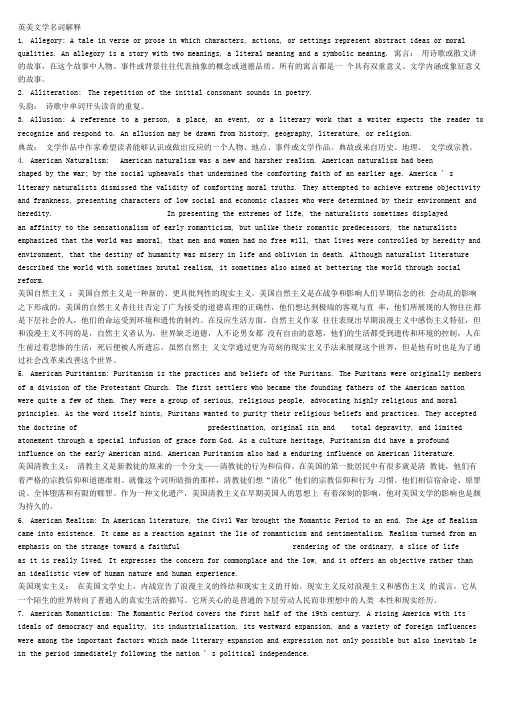
英美文学名词解释1.Allegory: A tale in verse or prose in which characters, actions, or settings represent abstract ideas or moral qualities. An allegory is a story with two meanings, a literal meaning and a symbolic meaning. 寓言:用诗歌或散文讲的故事,在这个故事中人物、事件或背景往往代表抽象的概念或道德品质。
所有的寓言都是一个具有双重意义、文学内涵或象征意义的故事。
2.Alliteration: The repetition of the initial consonant sounds in poetry.头韵:诗歌中单词开头读音的重复。
3.Allusion: A reference to a person, a place, an event, or a literary work that a writer expects the reader to recognize and respond to. An allusion may be drawn from history, geography, literature, or religion.典故:文学作品中作家希望读者能够认识或做出反应的一个人物、地点、事件或文学作品。
典故或来自历史、地理、文学或宗教。
4.American Naturalism: American naturalism was a new and harsher realism. American naturalism had beenshaped by the war; by the social upheavals that undermined the comforting faith of an earlier age. America ' sliterary naturalists dismissed the validity of comforting moral truths. They attempted to achieve extreme objectivity and frankness, presenting characters of low social and economic classes who were determined by their environment and heredity. In presenting the extremes of life, the naturalists sometimes displayedan affinity to the sensationalism of early romanticism, but unlike their romantic predecessors, the naturalists emphasized that the world was amoral, that men and women had no free will, that lives were controlled by heredity and environment, that the destiny of humanity was misery in life and oblivion in death. Although naturalist literature described the world with sometimes brutal realism, it sometimes also aimed at bettering the world through social reform.美国自然主义:美国自然主义是一种新的、更具批判性的现实主义。
英美文学名词解释
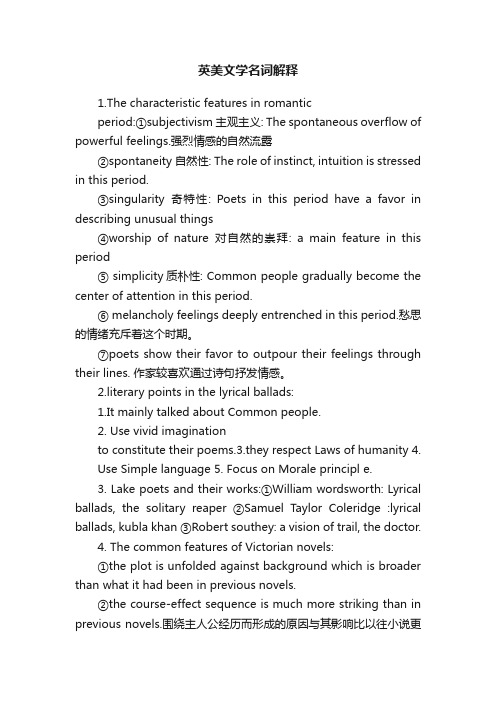
英美文学名词解释1.The characteristic features in romanticperiod:①subjectivism主观主义: The spontaneous overflow of powerful feelings.强烈情感的自然流露②spontaneity自然性: The role of instinct, intuition is stressed in this period.③singularity奇特性: Poets in this period have a favor in describing unusual things④worship of nature对自然的崇拜: a main feature in this period⑤ simplicity质朴性: Common people gradually become the center of attention in this period.⑥ melan choly feelings deeply entrenched in this period.愁思的情绪充斥着这个时期。
⑦poets show their favor to outpour their feelings through their lines. 作家较喜欢通过诗句抒发情感。
2.literary points in the lyrical ballads:1.It mainly talked about Common people.2. Use vivid imaginationto constitute their poems.3.they respect Laws of humanity 4.Use Simple language 5. Focus on Morale principl e.3. Lake poets and their works:①William wordsworth: Lyrical ballads, the solitary reaper ②Samuel Taylor Coleridge :lyrical ballads, kubla khan ③Ro bert southey: a vision of trail, the doctor.4. The common features of Victorian novels:①the plot is unfolded against background which is broader than what it had been in previous novels.②the course-effect sequence is much more striking than in previous novels.围绕主人公经历而形成的原因与其影响比以往小说更显精彩。
英美文学名词解释
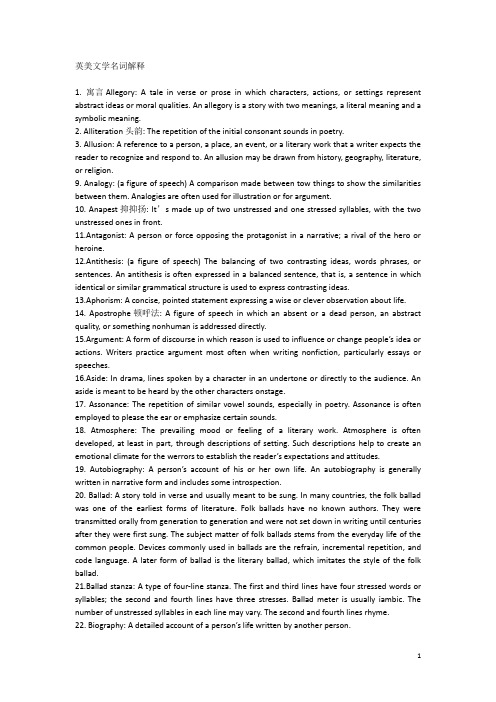
英美文学名词解释1. 寓言Allegory: A tale in verse or prose in which characters, actions, or settings represent abstract ideas or moral qualities. An allegory is a story with two meanings, a literal meaning and a symbolic meaning.2. Alliteration头韵: The repetition of the initial consonant sounds in poetry.3. Allusion: A reference to a person, a place, an event, or a literary work that a writer expects the reader to recognize and respond to. An allusion may be drawn from history, geography, literature, or religion.9. Analogy: (a figure of speech) A comparison made between tow things to show the similarities between them. Analogies are often used for illustration or for argument.10. Anapest抑抑扬: It’s made up of two unstressed and one stressed syllables, with the two unstressed ones in front.11.Antagonist: A person or force opposing the protagonist in a narrative; a rival of the hero or heroine.12.Antithesis: (a figure of speech) The balancing of two contrasting ideas, words phrases, or sentences. An antithesis is often expressed in a balanced sentence, that is, a sentence in which identical or similar grammatical structure is used to express contrasting ideas.13.Aphorism: A concise, pointed statement expressing a wise or clever observation about life.14. Apostrophe顿呼法: A figure of speech in which an absent or a dead person, an abstract quality, or something nonhuman is addressed directly.15.Argument: A form of discourse in which reason is used to influence or change people’s idea or actions. Writers practice argument most often when writing nonfiction, particularly essays or speeches.16.Aside: In drama, lines spoken by a character in an undertone or directly to the audience. An aside is meant to be heard by the other characters onstage.17. Assonance: The repetition of similar vowel sounds, especially in poetry. Assonance is often employed to please the ear or emphasize certain sounds.18. Atmosphere: The prevailing mood or feeling of a literary work. Atmosphere is often developed, at least in part, through descriptions of setting. Such descriptions help to create an emotional climate for the werrors to establish the reader’s expectations and attitudes.19. Autobiography: A person’s account of his or her own life. An autobiography is generally written in narrative form and includes some introspection.20. Ballad: A story told in verse and usually meant to be sung. In many countries, the folk ballad was one of the earliest forms of literature. Folk ballads have no known authors. They were transmitted orally from generation to generation and were not set down in writing until centuries after they were first sung. The subject matter of folk ballads stems from the everyday life of the common people. Devices commonly used in ballads are the refrain, incremental repetition, and code language. A later form of ballad is the literary ballad, which imitates the style of the folk ballad.21.Ballad stanza: A type of four-line stanza. The first and third lines have four stressed words or syllables; the second and fourth lines have three stresses. Ballad meter is usually iambic. The number of unstressed syllables in each line may vary. The second and fourth lines rhyme.22. Biography: A detailed account of a person’s life written by another person.23. Blank verse: Verse written in unrhymed iambic pentameter.24. Caesura诗间休止: A break or pause in a line of poetry.25. Canto: A section or division of a long poem.26. Caricature: The use of exaggeration or distortion to make a figure appear comic or ridiculous.A physical characteristic, an eccentricity, a personality trait, or an act may be exaggerated.27.Character: In appreciating a short story, characters are an indispensable element. Characters are the persons presented in a dramatic or narrative work. Forst divides characters into two types: flat character, which is presented without much individualizing detail; and round character, which is complex in temperament and motivation and is represented with subtle particularity.28. Characterizatiogogoo, the means by which a writer reveals that personality.29.Classicism: A movement or tendency in art, literature, or music that reflects the principles manifested in the art of ancient Greece and Rome. Classicism emphasizes the traditional and the universal, and places value on reason, clarity, balance, and order. Classicism, with its concern for reason and universal themes, is traditionally opposed to Romanticism, which is concerned with emotions and personal themes.30.Climax: The point of greatest intensity, interest, or suspense in a gogo tory’s turning point. The action leading to the climax and the simultaneous increase of tension in the plot are known as the rising action. All action after the climax is referred to as the falling action, or resolution. The term crisis is sometimes used interchangeably with climax.31. Comedy: in general, a literary work that ends happily with a healthy, amicable armistice between the protagonist and society.32.Conceit: A kind of metaphor that makes a comparison between two startlingly different things.A conceit may be a brief metaphor, but it usually provides the framework for an entire poem. An especially unusual and intellectual kind of conceit is the metaphysical conceit.1.33. Conflict: A struggle between two opposing forces or characters in a short story, novel, play, or narrative poem. Usually the events of the story are all related to the conflict, and the conflict is resolved in some way by the story’s end.34. Connotation: All the emotions and associations that a word or phrase may arouse. Connot ation is distinct from denotation, which is the literal or “ dictionary” meaning of a word or phrase.35.Consonance: The repetition of similar consonant sounds in the middle or at the end of words.36. Couplet: Two consecutive lines of poetry that rhyme. A heroic couplet is an iambic pentameter couplet.37. Critical Realism: The critical realism of the 19th century flourished in the fouties and in the beginning of fifties. The realists first and foremost set themselves the task of criticizing capitalist society from a democratic viewpoint and delineated the crying contradictions of bourgeois reality. But they did not find a way to eradicate social evils.38. Dactyl扬抑抑: It’s made up of one stressed and two unstressed syllables, with the stressed in front.39. Denotation: The literal or “dictionary” meaning of a word.40. Denouement结局: The outcome of a plot. The denouement is that part of a play, short story, novel, or narrative poem in which conflicts are resolved or unraveled, and mysteries and secrets connected with the plot are explained.41. Description: It is a great part of conversation and of almost all writing. It is a part of autobiography, storytelling. With description, the writer tries terror, feel, and hear by showing rather than by merely telling. It’s through the use of specific details and concrete language that abstract ideas and half-formed thoughts are make vividly real. We have objective and subjective description.42. Diction: A writer’s choice of wo rds, particularly for clarity, effectiveness, and precision.43. Dissonance: A harsh or disagreeable combination of sounds; discord.44. Dramatic monologue: A kind of narrative poem in which one character speaks to one or more listeners whose replies are not given in the poem. The occasion is usually a crucial one in the speaker’s personality as well as the incident that is the subject of the poem.45. Elegy: A poem of mourning, usually over the death of an individual. An elegy is a type of lyric poem, usually formal in language and structure, and solemn or even melancholy in tone.46. Emblematic image: A verbal picture or figure with a long tradition of moral or religious meaning attached to it.47. Enlightenment: With the advent of the 18th century, in England, as in other European countries, there sprang into life a public movement known as the Enlightenment. The Enlightenment on the whole, was an expression of struggle of the then progressive class of bourgeois against feudalism. The egogo inequality, stagnation, prejudices and other survivals of feudalism. The attempted to place all branches of science at the service of mankind by connecting them with the actual deeds and requirements of the people.48. Epic: A long narrative poem telling about the deeds of a great hero and reflecting the values of the society from which it originated. Many epics were drawn from an oral tradition and were transmitted by song and recitation before they were written down.49. Epigram: A short, witty, pointed statement often in the form of a poem.50. Epigraph: A quotation or motto at the beginning of a chapter, book, short story, or poem that makes some point about the work.51. Epilogue收场白: A short addition or conclusion at the end of a literary work.52. Epiphany主显节: A moment of illumination, usually occurring at or near the end ofa work.53. Epitaph: An inscription on a gravestone or a short poem written in memory of someone who has died.54. Epithet称号: A descriptive name or phrase used to characterize someone or something.55. Era of Modernism: The years from 1910 to 1930 are often called the Era of Modernism, for there seems to have been in both Europe and America a strong awareness of some sort of “break” with the past. The new artists shared a desire to capture the complexity of modern life, to focus on the variety and confusion of the 20th century by reshaping and sometimes discarding the ideas and habits of the 19th century. The Era of Modernism was indeed the era of the New.56. Essay: A piece of prose writing, usually short, that deals with a subject in a limited way and expresses a particular point or view. An essay may be serious or humorous, tightly organized or rambling, restrained or emotional. The two general classifications of essay are theinformal essay and the formal essay. An informal essay is usually brief and is written as if the writer is talking informally to the reader about some topic, using a conversational style and a personal or humorous tone. By contrast, a formal essay is tightly organized, dignified in style, and serious in tone.57. Exemplum说教故事: A tale, usually inserted into the text of a sermon that illustrates a moral principle.58. Exposition: (1) That part of a narrative or drama in which important background information is revealed. (2) It is the kind of writing that is intended primarily to present information. Exposition is one of the major forms of discourse. The most familiar form it takes is in essays. Exposition is also that part of a play in which important background information is revealed to the audience.59. Fable: A fable is a short story, often with animals as its characters, which illustrate a moral.60. Farce: A type of comedy based on a ridiculous situation, often with stereotyped characters. The humor in a farce is largely slapstick—that is, it often involves crude physical action. The characters in a farce are often the butts of practical jokes.61. Figurative language: Language that is not intended to be interpreted in a literal sense. By appealing to the imagination, figurative language provides new ways of looking at the world. Figurative language consists of such figures of speech as hyperbole, metaphor, metonymy, oxymoron矛盾修饰法, personification, simile, and synecdoche.62. Figure of speech: A word or an expression that is not meant to be interpreted in a literal sense. The most common kinds of figures of speech—simile, metaphor, personification, and metonymy—involve a comparison between unlike things.63. Flashback: A scene in a short story, novel, play, or narrative poem that interrupts the action to show an event that happened earlier.64. Foil衬托: A character who sets off another character by contrast.65. Foot: It is a rhythmic unit, a specific combination of stressed and unstressed syllables.66. Foreshadowing: The use of hints or clues in a narrative to suggest what will happen later. Writers use foreshadowing to create interest and to build suspense. Sometimes foreshadowing also prepares the reader for the ending of the story.67. Free Verse: Verse that has either no metrical pattern or an irregular pattern.68. Hyperbole: A figure of speech using exaggeration, or overstatement, for special effect.69. Iamb抑扬格: It is the most commonly used foot in English poetry, in which an unstressed syllable comes first, followed by a stressed syllable.70. Iambic pentameter: A poetic line consisting of five verse feet, with each foot an iamb—that is, an unstressed syllable followed by a stressed syllable. Iambic pentameter is the most common verse line in English poetry.71. Image: We usually think with words, many of our thoughts come to us as pictures or imagined sensations in our mind. Such imagined pictures or sensations are called images.72. Imagery: Words or phrases that create pictures, or images, in the reader’s mind. Images can appeal to other senses as well: touch, taste, smell, and hearing.73. Imagism: It’s a poetic movement of England and the U.S. flourished from 1909 to 1917.The movement insists on the creation of images in poetry by “the direct treatment of the thing” and the economy of wording. The leader s of this movement were Ezra Pound and Amy Lowell.74. Incremental repetition: The repetition of a previous line, or lines but with a slight variation each time that advances the narrative stanza by stanza. This device is commonly used in ballads.75. In medias res: A technique of plunging into the middle of a story and only later usinga flashback to tell what has happened previously. In medias res is Latin for “in the middle of things”.76. Inversion: The technique of reversing, or inverting, the normal word order of a sentence. Writers may use inversion to create a certain tone or to emphasize a particular word or idea. A poet may invert a line so that it fits into a particular meter or rhyme scheme.77. Invocation: At the beginning of an epic (or other poem) a call to a muse, god, or spirit for inspiration.78. Irony: A contrast or an incongruity between what is stated and what is really meant, or between what is expected to happen and what actually happens. Three kinds of irony are (1) verbal irony, in which a writer or speaker says one thing and means something entirely different;(2) dramatic irony, in which a reader or an audience perceives something that a character in the story or play does not know; (3) irony of situation, in which the writer shows a discrepancy between the expected results of some action or situation and its actual results.79. Kenning代称: In Old English poetry, an elaborate phrase that describes persons, things, or events in a metaphorical and indirect way.80. Local Colorism: Local Colorism or Regionalism as a trend first made its presence felt in the late 1860s and early seventies in America. It may be defined as the careful attegogoms in speech, dress or behavior peculiar to a geographical locality. The ultimate aim of the local colorists is to create the illusion of an indigenous little world with qualities that tell it apart from the world outside. The social and intellectual climate of the country provided a stimulating milieu for the growth of local color fiction in America. Local colorists concerned themselves with presenting and interpreting the local character of their regions. They tended to idealize and glorify, but they never forgot to keep an eye on the truthful color of local life. They formed an important part of the realistic movement. Although it lost its momentum toward the end of the 19th century, the local spirit continued to inspire and fertilize the imagination of author.81. Lost Generation: This term has been used again and again to describe the people of the postwar years. It describes the Americans who remained in Paris as a colony of “ expatriates” or exiles. It describes the writers like Hemingway who lived in semi poverty. It describes the Americans who returned to their native land with an intense awareness of living in an unfamiliar changing world. The young English and American expatriates, men and women, were caught in the war and cut off from the old values and yet unable to come to terms with the new era when civilization had gone mad. They wandered pointlessly and restlessly, enjoying things like fishing, swimming, bullfight and beauties of nature, but they were aware all the while that the world is crazy and meaningless and futile. Their whole life is undercut and defeated.82. Lyric: A poem, usually a short one, that expresses a speaker’s personal thoughts or feelings. The elegy, ode, and sonnet are all forms of the lyric.83. Masque: An elaborate and spectacular dramatic entertainment that was popular among the English aristocracy in the late 16th and early 17th centuries. Masques were written as dramatic poems and make use of songs, dances, colorful costumes, and startling stage effects. 84. Melodrama通俗剧: A drama that has stereotyped characters, exaggerated emotions, and a conflict that pits an all-good hero or heroine against an all-evil villain. The good characters always win and the evil ones are always punished. Also, each character in a melodrama had a theme melody, which was played each time he or she made an appearance on stage.85. Metaphor: A figure of speech that makes a comparison between two things that are basically dissimilar. Unlike simile, a metaphor does not use a connective word such as like, as, or resembles in making the comparison.86. Metaphysical poetry: The poetry of John Donne and other 17th century poets who wrote in a similar style. Metaphysical poetry is characterized by verbal wit and excess, ingenious structure, irregular meter, colloquial language, elaborate imagery, and a drawing together of dissimilar ideas.87. Meter音步: A generally regular pattern of stressed and unstressed syllables in poetry.88. Metonymy: A figure of speech in which something very closely associated with a thing is used to stand for or suggest the thing itself.89. Miracle play: A popular religious drama of medieval England. Miracle plays were based on stories of the saints or on sacred history.90. Mock epic: A comic literary form that treats a trivial subject in the grand, heroic style of the epic. A mock epic is also referred to as a mock-heroic poem.91. Morality play: An outgrowth of miracle plays. Morality plays were popular in the 15th and 16th centuries. In them, virtues and vices were personified.92. Motif: A recurring feature (such as a name, an image, or a phrase) in a work of literature. A motif generally contributes in some way to the theme of a short story, novel, poem, or play. At times, motif is used to refer to some commonly used plot or character type in literature.93. Motivation: The reasons, either stated or implied, for a character’s behavior. To make a story believable, a writer must provide characters with motivation sufficient to explain what they do. Characters may be motivated by outside events, or they may be motivated by inner needs or fears.94. Multiple Point of View: It is one of the literary techniques William Faulkner used, which shows within the same story how the characters reacted differently to the same person or the same situation. The use of this technique gave the story a circular form wherein one event was the center, with various points of view radiating from it. The multiple points of view technique makes the reader recognize the difficulty of arriving at a true judgment.95. Myth: A story, often about immortals and sometimes connected with religious rituals, that is intended to give meaning to the mysteries of the world. Myths make it possible for people to understand and deal with things that they cannot control and often cannot see. A body of related myths that is accepted by a people is known as its mythology. A mythology tells a people what it is most concerned about.96. Narration: Like description, narration is a part of conversation and writing. Narrationis the major technique used in expository writing. Such as autobiography. Successful narration must grow out of good observation, to-the-point selection from observation, and clear arrangement of details in logical sequence, which is usually chronological. Narration gives an exact picture of things as they occur.97. Narrative poem: A poem that tells a story. One kind of narrative poem is the epic, a long poem that sets forth the heroic ideals of a particular society.98. Narrator: One who narrates, or tells, a story. A story may be told by a first-person narrator, someone who is either a major or minor character in the story. Or a story may be told by a third-person narrator, someone who is not in the story at all. The word narrator can also refer to a character in a drama who guides the audience through the play, often commenting on the action and sometimes participating in it.99. Naturalism: An extreme form of realism. Naturalistic writers usually depict the sordid side of life and show characters who are severely, if not hopelessly, limited by their environment or heredity.100. Neoclassicism: A revival in the 17th agogo of order, balance, and harmony in literature.101. Nonet: the nine-line stanza. Spenserian stanza: ababbcbcc.102. Nonfiction: It refers to any prose narrative that tells about things as the actually happened or that presents factual information about something. The purpose of this kind of writing is to give a presumably accurate accounting of a person’s life. Writers of nonfiction use the major forms of discourse: description (an impression of the subject); narration (the telling of the story); exposition (explanatory information); persuas ion (an argument to influence people’s thinking). Forms: autobiography, biography, essay, story, editorial, letters to the editor found in newspaper, diary, journal, travel literature.103. Novel: A book-length fictional prose narrative, having may characters and often a complex plot.104. Octava: the eight-line stanza. 2 quatrains/ 2 triplets + 1 couplet.105. Ode: A complex and often lengthy lyric poem, written in a dignified formal style on some lofty or serious subject. Odes are often written for a special occasion, to honor a person or a season or to commemorate an event.106. Onomatopoeia: The use of a word whose sound in some degree imitates or suggests its meaning.107. Oxymoron: a figure of speech that combines opposite or contradictory ideas or terms. An oxymoron suggests a paradox, but it does so very briefly, usually in two or three words. 108. Paradox: A statement that reveals a kind of truth, although it seems at first to be self-contradictory and untrue.109. Parallelism: (a figure of speech) The use of phrases, clauses, or sentences that are similar or complementary in structure or in meaning. Parallelism is a form of repetition.110. Parody: The humorous imitation of a work of literature, art, or music. A parody often achieves its humorous effect through the use of exaggeration or mockery. In literature, parody can be make of a plot, a character, a writing style, or a sentiment or theme.111. Pastoral: A type of poem that deals in an idealized way with shepherds and rustic life.112. Pathos: The quality in a work of literature or art that arouses the reader’s feelingsof pity, sorrow, or compassion for a character. The term is usually used to refer to situations in which innocent characters suffer through no fault of their own.113. Persuasion: It’s the type of speaking or writing that is intended to make its audience adopt a certain opinion or perform an action or do both. Persuasion is one of the major forms of discourse.114. Pictorialism: It’s an important poetic device characterized by efforts to achieve striking visual effects. Among its features are irregularity of line, contrast or enchantment of light, color and image. Other means of pictorialism include personification, juxtaposition and the matching of colors with verbs of action.115. Plot: Plot is the first and most obvious quality of a story. It is the sequence of events or actions in a short story, novel, play, or narrative poem. For the reader, the plot is the underlying pattern in a work of fiction, the structural element that gives it unity and order. For the writer, the plot is the guiding principle of selection and arrangement. Conflict, a struggle of some kind, is the most important element of plot. Each event in the plot is related to the conflict, the struggle that the main character undergoes. Conflict may be external or internal, and there may be more than one form of conflict in a work. As the plot advances, we learn how the conflict is resolved. Action is generally introduced by the exposition, information essential to understanding the situation. The action rises to a crisis, or climax. This movement is called the rising action. The falling action, which follows the crisis, shows a reversal of fortune for the protagonist. The denouement or resolution is the moment when the conflict ends and the outcome of the action is clear.116. Poetry: The most distinctive characteristic of poetry is form and music. Poetry is concerned with not only what is said but how it is said. Poetry evokes emotions rather than express facts. Poetry means having a poetic experience. Imagination is also an essential quality of poetry. Poetry often leads us to new perceptions, new feelings and experiences of which we have not previously been aware.117. Point of view: The vantage point from which a narrative is told. There are two basic points of view: first-person and third-person. In the first-person point of view, the story is told by one of the characters in his or her own words. The first-person point of view is limited. In the third-person point of view, the narrator is not a character in the story. The narrator may be an omniscient. On the other hand, the third-person narrator might tell a story from the point of view of only one character in the story.118. Pre-Romanticism: It originated among the conservative groups of men and letters as a reaction against Enlightenment and found its most manifest expression in the “Gothic novel”. The term arising from the fact that the greater part of such romances were devoted to the medieval times.119. Protagonist: The central character of a drama, novel, short story, or narrative poem. The protagonist is the character on whom the action centers and with whom the reader sympathizes most. Usually the protagonist strives against an opposing force, or antagonist , to accomplish something.120. Psalm: A song or lyric poem in praise of God.121. Psychological Realism: It is the realistic writing that probes deeply into the complexities of characters’ thoughts and motivations. Henry James is considered the founder of psychological realism. His novel The Ambassadors is considered to be a masterpiece ofpsychological realism.122. Pun: The use of a word or phrase to suggest tow or more meaning at the same time. Puns are generally humorous.123. Quatrain: Usually a stanza or poem of four lines. A quatrain may also be any group of four lines unified by a rhyme scheme. Quatrains usually follow an abab, abba, or abcb rhyme scheme.124. Quintain: the five-line stanza.125. Realism: The attempt in literature and art to represent life as it really is, without sentimentalizing or idealizing it. Realistic writing often depicts the everyday life and speech of ordinary people. This has led, sometimes, to an emphasis on sordid details.126. Refrain: 叠句: A word phrase, line or group of lines repeated regularly in a poem, usually at the end of each stanza. Refrains are often used in ballads and narrative poems to create a songlike rhythm and to help build suspense. Refrains can also serve to emphasize a particular idea.127. Renaissance: The term originally indicated a revival of classical (Greek and Roman) arts and sciences after the dark ages of medieval obscurantism.128. Rhyme: It’s one of the three basic elements of traditional poetry. It is the repetition of sounds in two or more words or phrases that appear close to each other in a poem. If the rhyme occurs at the ends of lines, it is called end rhyme. If the rhyme occurs within a line, it is called internal rhyme. Approximate rhyme is rhyme in which only the final consonant sounds of the words are identical. A rhyme scheme is the pattern of rhymes in a poem. Interlocking rhyme is a rhyme scheme in which an unrhymed line in one stanza rhymes with a line in the following stanza. Interlocking rhyme occurs in an Italian verse form called terza rima.129. Rhythm: It is one of the three basic elements of traditional poetry. It is the arrangement of stressed and unstressed syllables into a pattern. Rhythm often gives a poem a distinct musical quality. Poets also use rhythm to echo meaning.130. Romance: Any imagination literature that is set in an idealized world and that deals with a heroic adventures and battles between good characters and villains or monsters.131. Romanticism: A movement that flourished in literature, philosophy, music, and art in Western culture during most of the 19th century, beginnigogom.132. Satire: A kind of writing that holds up to ridicule or contempt the weaknesses and wrongdoings of individuals, groups, institutions, or humanity in general. The aim of satirists is to set a moral standard for society, and they attempt to persuade the reader to see their point of view through the force of laughter.133. Scansion诗的韵律分析: The analysis of verse in terms of meter.134. Sentimentalism: Sentimentalism came into being as a result of a bitter discontent on the part of certain enlighteners in social reality.135. Septet: the seven-line stanza. Chaucerian stanza: ababbcc.136. Sestet: the six-line stanza. 3couplets/ a quatrain + a couplet/ 2 triplets.137. Setting: The time and place in which the events in a short story, novel, play or narrative poem occur. Setting can give us information, vital to plot and theme. Often, setting and character will reveal each other.138. Short Story: A short story is a brief prose fiction, usually one that can be read in a single sitting. It generally contains the six major elements of fiction—characterization, setting,。
英美文学史名词解释
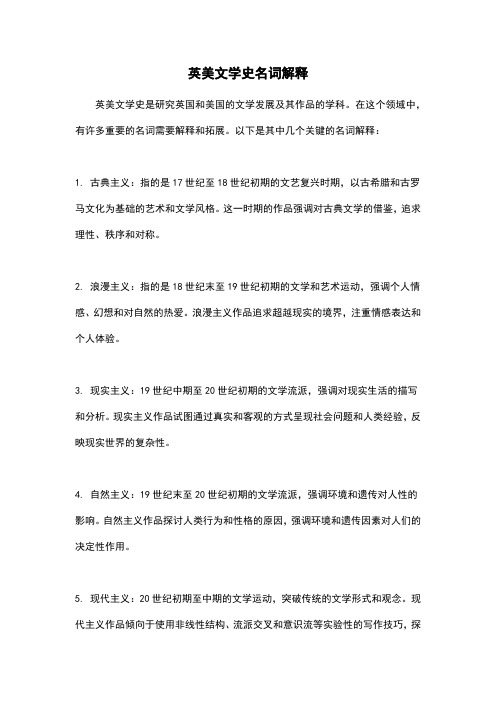
英美文学史名词解释
英美文学史是研究英国和美国的文学发展及其作品的学科。
在这个领域中,有许多重要的名词需要解释和拓展。
以下是其中几个关键的名词解释:
1. 古典主义:指的是17世纪至18世纪初期的文艺复兴时期,以古希腊和古罗马文化为基础的艺术和文学风格。
这一时期的作品强调对古典文学的借鉴,追求理性、秩序和对称。
2. 浪漫主义:指的是18世纪末至19世纪初期的文学和艺术运动,强调个人情感、幻想和对自然的热爱。
浪漫主义作品追求超越现实的境界,注重情感表达和个人体验。
3. 现实主义:19世纪中期至20世纪初期的文学流派,强调对现实生活的描写和分析。
现实主义作品试图通过真实和客观的方式呈现社会问题和人类经验,反映现实世界的复杂性。
4. 自然主义:19世纪末至20世纪初期的文学流派,强调环境和遗传对人性的影响。
自然主义作品探讨人类行为和性格的原因,强调环境和遗传因素对人们的决定性作用。
5. 现代主义:20世纪初期至中期的文学运动,突破传统的文学形式和观念。
现代主义作品倾向于使用非线性结构、流派交叉和意识流等实验性的写作技巧,探
索意识、时间和现代社会的复杂性。
除了这些名词,还有许多其他重要的概念和作品,如文艺复兴、启蒙运动、维多利亚时代、现代派诗歌、战争文学等。
研究英美文学史可以帮助我们了解不同时期的文学发展和作品背后的思想、价值观和文化背景。
- 1、下载文档前请自行甄别文档内容的完整性,平台不提供额外的编辑、内容补充、找答案等附加服务。
- 2、"仅部分预览"的文档,不可在线预览部分如存在完整性等问题,可反馈申请退款(可完整预览的文档不适用该条件!)。
- 3、如文档侵犯您的权益,请联系客服反馈,我们会尽快为您处理(人工客服工作时间:9:00-18:30)。
名词解释(英国)Epic(叙事诗): Epic is a narrative poem on the grand scale and in majestic style concerning the exploits and adventures of a superhuman hero (or heroes) engaged in a quest or some serious endeavor. Among noted epics are Homer’s Iliad and Odyssey, old English Beowulf and Milton’s Paradise Lost.Romance(传奇):A Romance is a long composition, in verse or in prose, describing the life and adventures of a noble hero. It generally concerns knights and involves a large amount of fighting as well as a number of miscellaneous adventures and a series of love stories.Ballad(民谣):Ballad is an anonymous narrative song, usually in 4-line stanzas, with the second and the fourth lines rhymed.Renaissance(文艺复兴):The word “Renaissance” means “rebirth”(of learning). The Renaissance period was marked by a reawakening of interest in learning, in the individual and in the world of nature. The revival of learning led scholars back to the culture of Greece and Rome. The rebirth of interest in the individual gave rise to a new appreciation of beauty, to a desire for self-expression in varied activities and to the creation of great works of art. The renewal of curiosity about the natural world ultimately drew men to discover new lands and new scientific truth. Humanism(人道主义):Humanism was a literary and philosophic system of thought which attempted to place the affairs of mankind at the centre of its concerns. According to humanists, man should mould the world according to his own desires, and attains happiness by removing all external checks by the exercise of the human intellect.Sonnet(十四行诗):A sonnet is a fourteen-line poem in iambic pentameter with a carefully patterned rhyme scheme. Puritanism(清教主义):Puritanism was the religiousdoctrine of revolutionarybourgeoisie during the EnglishRevolution. It preached thrift,sobriety, hard work andunceasing labor, with noextravagant enjoyment of thefruits of labor. Worldlypleasures were condemned asharmful. Puritans opposedchurches,squandering property.Enlightenment(启蒙运动):The movement, on the whole,an expression of the struggle ofthe bourgeoisie againstfeudalism, class inequality,stagnation and prejudices. Theenlighteners believed in thepower of reason and thewatchword was CommonSense.Neo-classicism(新古典主义):Modeling itself on theliterature of ancient Greece andRome, neoclassicism exalts thevirtues of proportion, unity,harmony, grace, taste, manners,and restraint. It values realismand reason over imaginationand emotion. Wit and satireflourished in this period, as didthe ode and verse written inheroic couplets.Romanticism(浪漫主义):Romanticism is a movementprevailing the Western world inthe 19th century in literature,art, music and philosophy,beginning as a reaction andprotest against the bondage ofrules and customs ofneo-classicism to unfetterhuman spirit. It returned tonature and plain humanity formaterial. It is a movement ofexpression of individualoriginality. Imagination ishighlighted and a dream ofgolden age is required againststern reality.Critical Realism(批判现实主义):Critical realistsdescribed with much vividnessand artistic skill the chief traitsof the English society andcriticized the capitalist systemfrom a democratic viewpoint.In their best works, the greedand hypocrisy of the upperclasses are contrasted with thehonesty and good-heartednessof the obscure “simple people”of the lower classes. Humorand satire abound. Withoutfinding a way of solution, theydo not point toward revolutionbut rather evolution orreformism with happy endings.Aestheticism(唯美主义):Thebasic theory of the Aestheticmovement---“art for art’s sake”.Aestheticism places art abovelife, and holds that life shouldimitate art, not art imitate life.According to the aesthetes, allartistic creation is absolutelysubjective as opposed toobjective. Only when art is forart’s sake, can it be immortal.Stream of Consciousness(意识流小说):First, it reveals theaction or plot through themental processes of thecharacters. Second, characterdevelopment is achievedthrough revelation of extremelypersonal and often typicalthought processes. Third, theaction of the plot seldomcorresponds to realchronological time, but movesback and forth through presenttime to memories of pastevents and dreams of the future.Fourth, it replaces narration,description, and commentarywith interior monologue andfree association.Women’s Movement(女性运动):feminism is a belief in thesocial, political and economicequality of the sexes, and amovement organized aroundthe conviction that biologicalsex should not be thepre-determinant factor shapinga person's social identity orsocio-political or economicrights.Oedipus Complex(恋母情结):In Greek myth, Oedipus isthe king who is said to kill hisfather and marry his mother.According to Freud, childrenmay have sexual drivessubconsciously toward theopposite parent. Here, Oedipuscomplex refers to that boy’sobsession to his mother. InEnglish literature, Lawrence isthe first to introduce malecharacters’ impotence tofemales because of mother’sexcessive love.。
